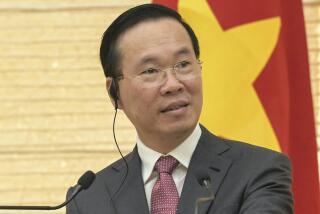Beijing Says Zhao Is Free and Being Paid
- Share via
BEIJING — Former Communist Party General Secretary Zhao Ziyang, who has been widely thought to be under house arrest for allying himself with pro-democracy demonstrators, remains free and is drawing his normal salary, a government spokesman said Sunday.
The statement by Yuan Mu, spokesman for the State Council, China’s Cabinet, is the government’s strongest indication yet that Zhao is unlikely to face a criminal trial. Zhao, who has not been seen in public since May 19, was removed from his post as party head in June for allegedly “splitting the party” and supporting what the government now calls a “counterrevolutionary rebellion.”
“Yuan Mu revealed that Zhao Ziyang remains free and enjoys the same pay and welfare as before,” the New China News Agency reported. “Zhao Ziyang still lives in Beijing.”
Yuan added, however, that the Communist Party is still investigating Zhao and that he will be treated according to “the facts of his mistakes.” Zhao, 70, who was replaced as general secretary by former Shanghai party chief Jiang Zemin, is still a Communist Party member, and he could be further punished by being stripped of his party membership.
Tells Japanese Reporters
Yuan’s remarks were made to visiting Japanese journalists, then distributed by the official Chinese news agency. He was not quoted as specifically dealing with the issue of whether Zhao might be tried.
But by officially indicating that there has been no decision to detain Zhao, even under house arrest, Yuan’s statement appeared to back up more informal comments made to Western reporters last week by Vice Minister of Culture Ying Ruocheng. Ying, when asked specifically whether Zhao would be placed on trial, replied: “I don’t think so. I don’t think so. That’s a personal opinion. (Not) unless he did something I didn’t know.”
Some hard-liners would prefer to take more severe action against Zhao, who was widely viewed as China’s most powerful advocate of rapid economic and political reform, in order to increase the difficulties he would face in any bid to return to power after paramount leader Deng Xiaoping, 85, leaves the political stage.
In an important indication that some economic reforms will continue despite Zhao’s fall, Yuan also announced the most sweeping price adjustments to be approved since an economic retrenchment program was launched a year ago. China will raise the prices of grain, cotton and some other farm produce, energy and some key raw materials in order to promote the development of these segments of its economy, Yuan said.
While the price boosts will occur under conditions of government control, they will bring the costs of these key items closer to true market prices and thus help eliminate some of the severe irrationality in pricing that distorts China’s economy.
Transport Prices Hiked
Early this month, transportation prices were raised sharply, with the average cost of long-distance train tickets jumping 120%. Large price jumps in the areas announced Sunday would be major steps toward price reform.
The conditions for carrying out price reform, which was put on hold last summer amid accelerating inflation, may have been improved by a government-initiated economic slowdown that has begun to show signs of sharply reducing inflation.
Official statistics released Sunday indicated that during the month of August, there was virtually no inflation in 35 large and medium-size cities across China.
Prices last December, according to official statistics, were up 26% over December, 1987. Figures released Sunday show that urban prices in August were up only 13% over August, 1987. The far greater part of that 13% rise--perhaps all of it--occurred during late 1988 and the first months of this year, when prices were climbing sharply. That means prices have been essentially stable over the summer.
Yuan said that China’s current restructuring program aims to strengthen agriculture and basic industries and infrastructure, while limiting “excessive development” of most light industries. The speed of expansion of small rural and private enterprises, which have been the most dynamic sector of China’s industrial economy, will be slowed, while their technological and management levels will be upgraded, he said.
Touching on other political questions, Yuan said that martial law in Beijing cannot be lifted soon because it is “one of the important factors to maintain the stability of the capital and the whole country,” the official news agency reported, paraphrasing his remarks.
Yuan also said that China will insist on maintaining the dictatorship of the Communist Party and that no independent trade unions, opposition parties or opposition factions will be allowed to exist.
More to Read
Sign up for Essential California
The most important California stories and recommendations in your inbox every morning.
You may occasionally receive promotional content from the Los Angeles Times.










